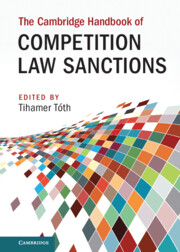Book contents
- The Cambridge Handbook of Competition Law Sanctions
- The Cambridge Handbook of Competition Law Sanctions
- Copyright page
- Contents
- Authors’ Affiliations
- Acknowledgment
- Part I General Chapters
- 1 The Quest to Create an Effective Set of Competition Law Sanctions
- 2 The Role of Fines in the Toolkit of Competition Agencies
- 3 Sanctions on Legal Persons
- 4 The Effectiveness of European Antitrust Fines
- 5 Corporate Governance and Competition Law Sanctions
- 6 Antitrust Criminalization As a Legitimate Deterrent
- 7 Criminalization of Anticompetitive Conducts
- 8 “Consensus”-Based Sanctions and Commitments
- 9 Effectiveness of Commitment Decisions
- 10 Compliance Policies and Sanctions
- 11 The Role of Administrative Courts in the Effective Enforcement of Competition Law Sanctions
- 12 Civil Sanctions in Antitrust Public Enforcement
- 13 What Role for Private Enforcement in EU Competition Law?
- 14 The Insights of Labor Law
- 15 Human Rights Jurisprudence and the Effectiveness of Competition Law Sanction
- 16 Catholic Teaching on Just Punishment, Especially in Connection with Financial Matters: According to the 1983 Code of Canon Law
- Part II Country Reports
13 - What Role for Private Enforcement in EU Competition Law?
A Religion in Quest of a Founder
from Part I - General Chapters
Published online by Cambridge University Press: 29 July 2022
- The Cambridge Handbook of Competition Law Sanctions
- The Cambridge Handbook of Competition Law Sanctions
- Copyright page
- Contents
- Authors’ Affiliations
- Acknowledgment
- Part I General Chapters
- 1 The Quest to Create an Effective Set of Competition Law Sanctions
- 2 The Role of Fines in the Toolkit of Competition Agencies
- 3 Sanctions on Legal Persons
- 4 The Effectiveness of European Antitrust Fines
- 5 Corporate Governance and Competition Law Sanctions
- 6 Antitrust Criminalization As a Legitimate Deterrent
- 7 Criminalization of Anticompetitive Conducts
- 8 “Consensus”-Based Sanctions and Commitments
- 9 Effectiveness of Commitment Decisions
- 10 Compliance Policies and Sanctions
- 11 The Role of Administrative Courts in the Effective Enforcement of Competition Law Sanctions
- 12 Civil Sanctions in Antitrust Public Enforcement
- 13 What Role for Private Enforcement in EU Competition Law?
- 14 The Insights of Labor Law
- 15 Human Rights Jurisprudence and the Effectiveness of Competition Law Sanction
- 16 Catholic Teaching on Just Punishment, Especially in Connection with Financial Matters: According to the 1983 Code of Canon Law
- Part II Country Reports
Summary
This chapter is a scholarly attempt to identify the purpose of private enforcement in EU competition law. Section 2 presents US antitrust law as the model where deterrence has a predominant role in private enforcement and which has served as a source of inspiration but not a role model for EU competition law. Section 3 presents the purpose-setting of EU competition law at the intersections of three aims: effective remedy in terms of in integrum restitutio, fundamental rights and public policy. Section 4 defines the limits of private enforcement’s deterrent function in EU competition law. The chapter’s central argument is that while private enforcement has multiple purposes in EU competition law, it represents an idiosyncratic compromise between policy-oriented deterrence and the traditional notions of civil law (full compensation, prohibition of unjust enrichment). It is demonstrated that while serving a public policy purpose and making use of the grey zone between compensatory and super-compensatory damages, EU “private competition law” does not go beyond that and remains within the confines of “compensation”. The fact that it is the deterrent side-effects that make private enforcement relevant for EU competition law and subject to special legislative attention does not call into question its compensation-oriented DNA.
Keywords
- Type
- Chapter
- Information
- The Cambridge Handbook of Competition Law Sanctions , pp. 218 - 229Publisher: Cambridge University PressPrint publication year: 2022
- 2
- Cited by



